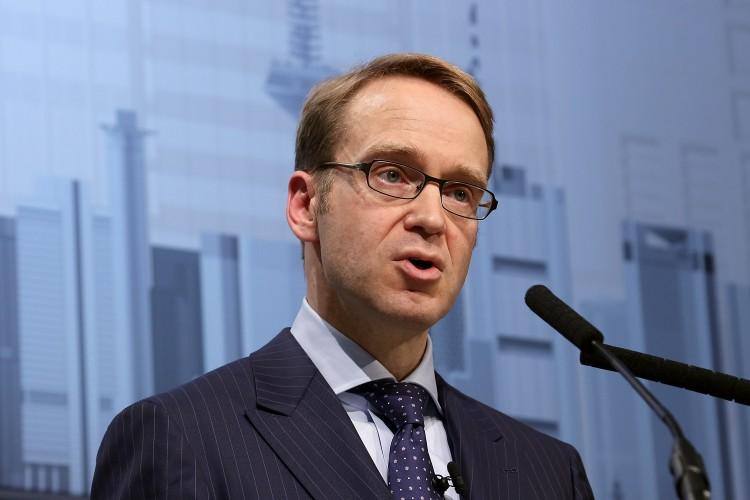Last week was quiet in terms of trading and news flow in the eurozone. A bit of Greece, and a bit of debate about the euro-dollar exchange rate rounded out the week.
One important development, however, was hardly talked about.
In line with earlier reports in the German press, the German central bank (Bundesbank) on Jan. 16 released an official statement saying it would start repatriating some of its gold reserves.
Germany will receive 300 metric tons from its stash in New York and 374 tons from Paris. Markets did not budge, with both the euro and the EURO STOXX equity index unchanged for the week.
The Bundesbank had been storing most of its gold reserves abroad in London, Paris, and New York. It made sense during the Cold War, as the gold was safe from a potential Soviet invasion. In addition, the three cities are major gold trading centers and the Bundesbank could easily move its reserves. This could have been necessary to settle trade imbalances under the Bretton-Woods exchange rate system or in order to obtain foreign currency in case of a domestic currency crisis.
Bundesbank Changes Direction
After the fall of the Berlin Wall in 1989 and the introduction of euro notes and coins in 2002, most of the aforementioned reasons became irrelevant. Threat of an invasion was eliminated after the collapse of the Soviet Union.
It also did not make sense to hold gold in Paris anymore and possibly exchange it for currency, as Germany and Paris are now using the same currency, the euro.
And yet, during all these years, the Bundesbank had never even thought about repatriating some of its gold reserves. In fact, last fall it summarily dismissed the directive of a government oversight body to assess and value all of the German gold reserves.
In a speech given by a Bundesbank official in New York in November 2012, he stressed the “excellent relationship between the Bundesbank and the U.S. Fed,” and said that the Bundesbank trusted the Fed enough that no audit would be necessary. Not even the most fervent German gold bugs would have thought about actual repatriation at that time.
So what prompted this sudden about-face? The Bundesbank itself said that given the end of the Cold War and the currency union with France, it would make sense to repatriate some gold.
In addition, some “new” vault capacity in Frankfurt has become available. It hopes that this move will “build trust and confidence domestically,” as pressure from the government and citizens to bring the gold home has grown.
With respect to the exact timing of the announcement, officials might have wanted to wait for a calm moment in the euro crisis and global markets. If that was the case, then the timing could not have been better.
Some Peculiar Issues Remain
The official reasoning for moving the gold doesn’t add up.
First, the Bundesbank has known for 10 years that it did not need Paris as a location anymore, since the euro was introduced in 2002. Second, the argument that vault capacity had been taken because of the issuance of euro notes and coins would have made sense if it were 2003. It is the year 2013, however, and the euro conversion had successfully completed a long time ago.
From an economic point of few, it makes more sense that the Bundesbank determined that it needed most of its gold reserves at home if the euro breaks up in a worst-case scenario. So Germany is playing it safe and is going to withdraw the gold from Paris, just in case.
If the euro indeed were to break up, Germany would need more than the Paris reserves and the reserves in Frankfurt, which add up to 42 percent of its reserves, to credibly relaunch the Deutsche mark.
This is likely the reason why they also decided to pull some of the gold out of New York, which currently holds 45 percent of German gold.
The relatively long timeframe until 2020 is surprising, given that moving 674 metric tons is manageable. As a comparison, Venezuela succeeded in moving all of its gold (160 tons) out of Europe in four short months at the end of 2011. To move an amount roughly 4 times as much, should not take longer than 2 years.
Because the announcement would be considered a rash move in any case, this could be interpreted as a concession to Germany’s longtime partners giving them ample time to prepare. On the flip side, it will fuel further speculation about how much “Good Delivery” bars are actually available in New York and Paris and whether they have been lent out on the gold lease market. If that is the case, it will take some time to unchain the collateral claims.
There is nothing to expect from policymakers next week, but keep an eye on Spanish unemployment figures and the forward looking Purchasing Manager Indices to gauge European economic health..
The Epoch Times publishes in 35 countries and in 21 languages. Subscribe to our e-newsletter.







